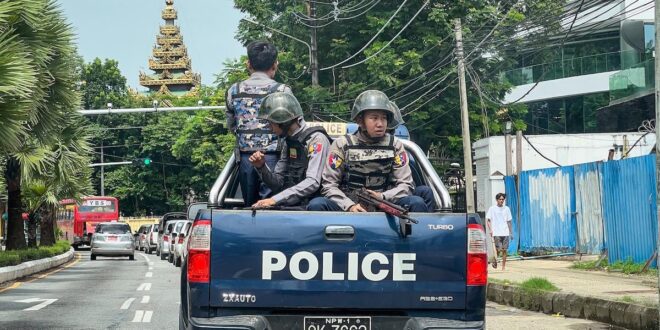My Father’s Dream of Returning Home
A few months ago, my father passed away in Australia, longing to return one day to his homeland of Myanmar. Unfortunately, the idea of going back home was simply impossible. His health was deteriorating, and the political situation in Myanmar had become increasingly dangerous. The junta, which had seized power in a coup in 2021, was unleashing violence and refusing to relinquish control. Yet, despite his weakened state, my father’s thoughts were always consumed with the ongoing resistance to military rule.
Myanmar has a long history of cycles of violence and dictatorship, and it was not surprising to many of its people that the country was once again facing global condemnation. I was born in the 1980s, during a time of military oppression and economic turmoil in Myanmar. Since the 1962 coup, the military had been running the country under the guise of the “Burmese Way to Socialism,” using it as an excuse to seize properties, monopolize the economy, and suppress any form of dissent. In my early childhood, my parents decided to leave the country, seeking better opportunities elsewhere.
Hope and Despair in Samoa
We ended up in Samoa, more than 6,000 miles away from Yangon, Myanmar’s major city. My upbringing in Samoa was idyllic – running barefoot to school and swimming in the vibrant coral reefs. However, my father’s fellowship stipend was limited, and I remember his worrisome expression whenever he couldn’t pack our lunch boxes to the brim. By 1988, his homesickness became unbearable, and he longed to return to Myanmar. But fate had other plans.
That year, a people’s movement sparked in Myanmar. Student-led protests spread across the country, demanding an end to military rule, international isolation, and poverty. On August 8, 1988, the military responded with brutal force, opening fire on peaceful demonstrators. The casualties included monks, doctors, lawyers, human rights advocates, writers, university students, and even schoolchildren – some of whom were my sister’s classmates. My father, desperate for news from his protesting brothers and friends, would sometimes sleep in his office, waiting anxiously. It was during this time that I realized our dreams of returning were shattered.
The international response to the 1988 uprising was muted, and Myanmar spiraled into a culture of military impunity. With no smartphones to livestream the atrocities, the people of Myanmar were left to face the military’s atrocities alone. Thousands of activists were detained, beaten, tortured, and killed. Myanmar disappeared from international news for many years, with occasional mentions of Aung San Suu Kyi’s house arrest and the suppression of her political party, the National League for Democracy.
A Brief Window of Hope
In 2010, the military started to ease restrictions, releasing Aung San Suu Kyi from house arrest and allowing foreign visitors into the country. Censorship on print media was lifted, giving Myanmar a taste of press freedom after decades of oppression. The military even announced the first competitive general elections in almost three decades, scheduled for 2015. This news compelled me to return to Myanmar and contribute as a journalist, to help a society burdened by generations of corrupt generals.
When the National League for Democracy won by a landslide in the November 2015 elections, I joined the jubilant crowd flooding the streets of Yangon. A rickshaw driver, tears streaming down his face, grabbed me in excitement and exclaimed, “It happened, sister! I thought it would only happen in our wildest dreams.” But what started as a hard-fought dream swiftly transformed into a nightmare.
From Dream to Nightmare
During the NLD government’s rule, the military escalated its abuses. In 2017, they launched a horrific campaign of ethnic cleansing against the Rohingya minority, constituting crimes against humanity and acts of genocide. Aung San Suu Kyi, distressingly, supported the military’s actions, irreparably damaging her international reputation. Despite her loyalty, the generals were not satisfied.
On February 1, 2021, the military staged another coup, disregarding the overwhelming victory of the ruling NLD in the November 2020 elections. Claiming fraud without substantial evidence, the military suppressed peaceful protests with deadly force. My father and I, forced to leave Myanmar due to the COVID-19 pandemic in 2020, watched helplessly from Australia. Our temporary departure turned into a prolonged absence as the killings and violence intensified.
Continued Atrocities and Resilient Youth
Since the coup, I have been documenting the junta’s countless atrocities as a researcher for Human Rights Watch. Mass killings, arbitrary arrests, detention, torture, sexual violence, and attacks on civilians have become routine under the military’s rule. According to the United Nations, more than 3,700 people have been killed, while thousands more are arbitrarily detained. The military has burned tens of thousands of homes and displaced over 1.5 million people in an attempt to crush resistance.
Yet, amidst the darkness, Myanmar’s youth refuse to surrender. They display unprecedented strength and determination in their struggle for democracy and civilian rule. Despite the grave risks they face, they organize and resist the military in any way possible. Some have even joined armed groups to defend against the onslaught of attacks. Equipped with smartphones, these young people strive to ensure that the world knows about the atrocities occurring in Myanmar.
The recent “partial pardon” of Aung San Suu Kyi by the military should not deceive the international community. The deadly abuses committed by the military continue unabated. Governments worldwide must take action, moving beyond passive observation. Targeted sanctions have proven effective in pressuring junta leaders and businesses affiliated with the military. Better coordination among countries is needed to undermine the military’s access to aviation fuel and revenue from Myanmar’s oil and gas industry, which they utilize to procure weapons.
Ignorance must not be an excuse for inaction. The people of Myanmar have suffered for far too long under the oppressive rule of the military. It is time for the international community to stand in solidarity with Myanmar’s resilient youth and work towards a future where democracy prevails over military dictatorship.
 Mind Uncharted Explore. Discover. Learn.
Mind Uncharted Explore. Discover. Learn.




